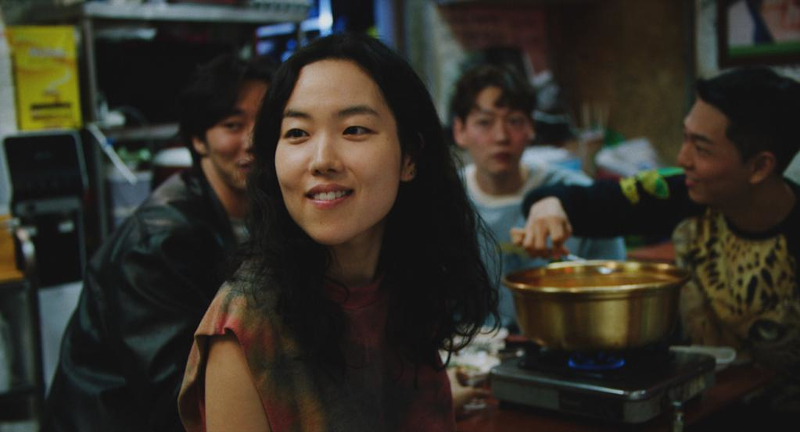Director – Davy Chou – 2022 – France, Belgium, Germany, South Korea – Cert. 15 – 118m
****1/2
A woman born in South Korea and fostered by parents in France unexpectedly returns to the land of her birth – on MUBI from Friday, July 7th
Although it looks at first glance like a South Korean movie, this is actually a predominantly European production, and within that, predominantly French. Its central character is South Korean by birth, but adopted at a very young age and raised by foster parents in France, who she considers her parents. She also may look Korean, but considers herself French. She speaks French, and English too, pretty well, but no Korean. (In South Korea, English appears to function as the go-to language for communicating with foreigners.) She feels French. The film takes place in South Korea, and most (but not all) of the characters are South Korean.
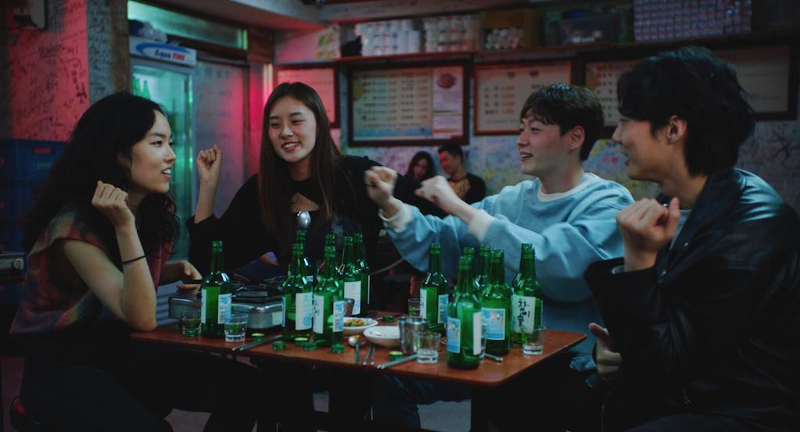
Freddie aka Frédérique Benoît (Park Ji-min) sits chatting in the restaurant of the Francophile guest house with her new-found friends Tena (Guka Han) and Dongwan (Son Seung-beom). They explain you don’t pour yourself soju – you wait for your friends to pour it, because if they don’t keep you supplied, what kind of friends would they be? She promptly takes two more bottles from the freezer and gets some three tables worth of strangers together. The conversation, initially in English, soon switches to French (even though one or two of those present are Korean-speaking natives). She wakes in the wee small hours, unable to remember if she’s had sex with the young man sleeping beside her, so she asks if he’d mind having it with her again.
She hadn’t expected to be in South Korea and will only be staying two weeks. (It later emerges that she had two weeks off work and planned to go to Japan as usual, but the flights were cancelled because of a typhoon and the first flight she could get anywhere was to Korea.) Tena has told her she should visit Hammonds, South Korea’s well-known adoption service, but dealing with the older woman in the Seoul office, she finds herself confronted with rigid bureaucratic hurdle after rigid bureaucratic hurdle, and it looks like without the right forms or official identification, they won’t be able to help her. But then she produces a small photo of her mother with a number on the back, and that turns out to be enough to get her a photocopy of her case file. She learns her birth name is Yeon-hee.
The agency must operate within the guidelines of Korean law, which appear to be designed to protect birth parents’ identities should they with to remain hidden from their offspring rather than helping their children find them. All they can do is send a fixed number of telegrams a year to both parents (or each parent, if separated) as any more would be considered harassment. And they can’t give out the address to children seeking their parents.
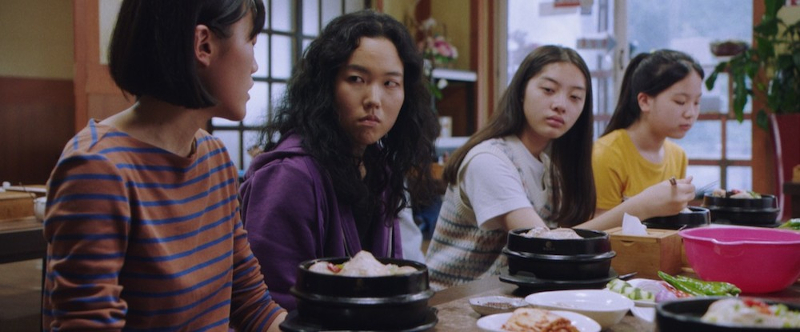
There is a swift response from her father and silence from her mother. Her father (Oh Kwang-rok from Lady Vengeance, 2005; Oldboy, 2003, both Park Chan-wook) lives in coastal fishing village Gunsan, where it turns out he has a wife (who speaks rudimentary English so can act as translator) (Kim Sun-young) and two teenage daughters. They live with his mother. He never told his family about her for fear of upsetting them, but did so when the letter arrived.
If the free-spirited Freddie felt at odds with the servile, bureaucratic Hammonds she experienced in Seoul, her father and his family are even more conservative. (Even more Korean, if you will.) Her father expresses grief at what happened, saying he was very young, and wants her to come and live with them. Her mother left him because she wanted to live in the city. He would help Freddie to get married. She tries to explain: she’s French now. He shows her the town, buying a pair of high heels (which she disparagingly refers to as ballet shoes) at a market stall, which shoes she later dumps when on her own in a Seoul park.
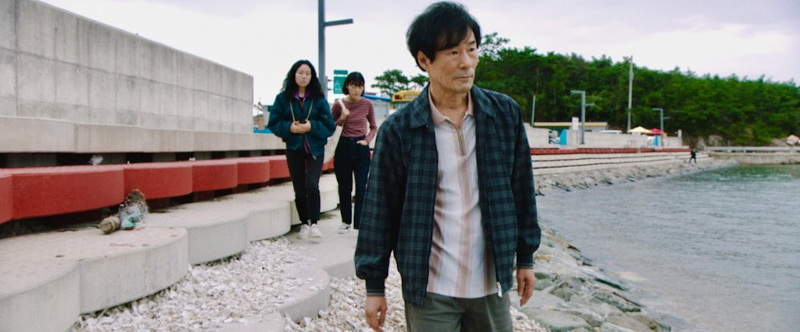
After leaving Gunsan, she finds herself inundated with her father’s texts in Korean, which she doesn’t understand.
Hanging out with Tena and the Korean from her one-night stand, Freddie discovers he wants a deeper relationship but isn’t really interested; the conservative again. She refuses him. She likes the music playing and, unable to get Tena to join her, dances solo to the music (and the ironic lyrics, “you can’t make it alone”). She ends up taking the DJ back to her hotel, or at least would have done so had not her father (with translator wife) turned up in the alley outside her hostel to plead that she come and live with him.
The narrative never leaves Korea. Two years later, on her 27th birthday, she has a good corporate job and is on a Tinder date in a Seoul bar with an older Frenchman André (Louis-Do de Lencquesaing) who turns out to be an arms dealer and sees an aptitude in her that would make her perfect to do the same thing. She subsequently returns to her tattooist friend and partner Maxime (Yoann Zimmer) to be served up a surprise birthday party in the club below his parlour. I hate my birthday, she tells him. In the morning, she thanks the old lady gardening on the next rooftop for her radish kimchi.
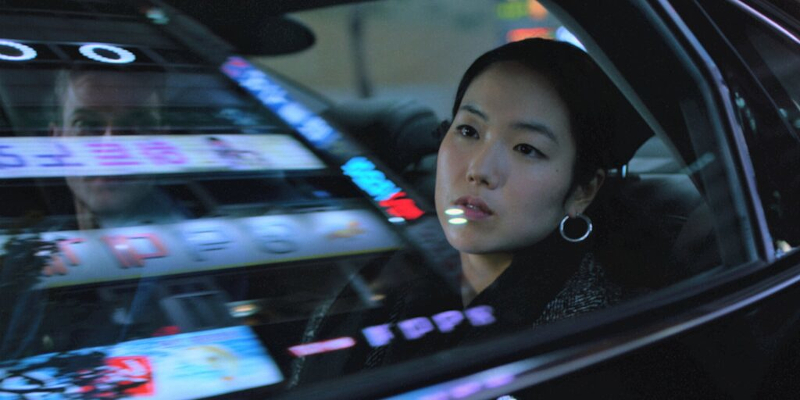
Five years later, everyone’s wearing masks (presumably this is 2020 and pandemic onset). She is still in touch with André by phone and, in fact, working with him. She agrees to meet her father and his wife in a restaurant, accompanied by Maxime. She still regards her father as toxic, although he has been drinking less than before. She claims to no longer drink and shocks them with the admission that she sells missiles “to defend South Korea from the North”. She claims they are only briefly visiting Korea, although in fact she’s living in Seoul, diverting the taxi he booked to the airport to Itaewon, the nightlife area.
A surprise Hammonds phone call reveals that her mother has got in touch, and she meets her briefly at the Hammond building in Jeonju (the historic Korean capital). A year later, though, while backpacking and staying overnight at a hostel, Freddie finally tries texting her only to learn that the phone number is no longer in service.
The charismatic Park Ji-min is terrific as Freddie, making her seem relateable, no mean feat when she behaves with the disregard for so many others that she does. Her free-spiritedness is clearly an attitude she’s learned in France that sits uneasily in any part of largely conservative South Korea other than its seedier, cultural underbelly, where she ends up living and spending much of her time.
There’s a constant tension between the way she thinks, moves and lives her life and the norms of Korean society, with its bureaucratic acceptance of and adherence to rules and its widespread bias towards traditional family values, none of which she understands and all of which she rejects. Even as she constantly asserts her French identity, something keeps her in Korea. At the same time, though, her drift into arms dealing suggests she lacks any kind of moral centre, a suggestion enforced by her lengthy attempt at justifying her new career to her father and his wife, which boils down to largely empty rhetoric. Life has dealt this woman a shitty hand, and she has long since ceased to care.
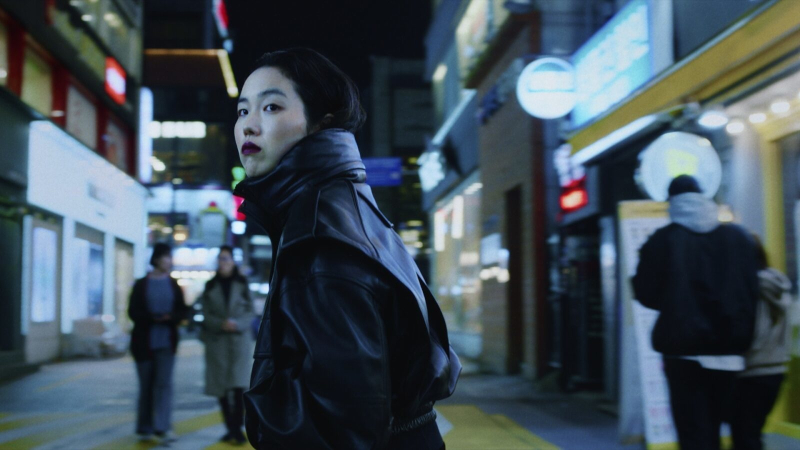
Nevertheless, she is determined to make her way in the world, and on her own terms. She emerges as an archetypal Korean anti-heroine, ultimately torn between prematurely leaving the hotel she’s booked for the night as a backpacker or sitting in the lobby playing Bach on the piano, at once asserting a sense of self through someone else’s art and a lone spirit, abandoned as she sees it by wider Korean society, whose place in the dark nooks and crannies of the world that she has carved out for herself remains dubious at best.
As a character study, which is essentially what the film is, with its damaged protagonist who may not be entirely what she seems, it’s not a thousand miles from the work of Paul Schrader, whose Master Gardener (2022) opens here shortly.
And although the art direction and costume design are executed by Korean personnel, the majority of the crew is French, with the piece feeling, aside from elements of local colour, more European than Korean. Which is not to say that admirers of Korean cinema won’t warm to it, more that it’s something else, not exactly a fit with the usual Korean mindset, a little bit like all those immigrants to the US who became film directors and made Hollywood movies, and in doing so, showed us a country that many of its occupants could not have seen let alone portrayed. So it may be that the film will find its international audience not in the usual, Far East-obsessed crowd, but in a wider arthouse one more interested in foreign films or world cinema.
For myself though, as a long-time admirer of East Asian movies, albeit one who watches many other types of cinema as well, I found it weirdly compelling.
Return To Seoul is on MUBI from Friday, July 7th, following its release in cinemas in the UK on Friday, May 5th.
Trailer:
